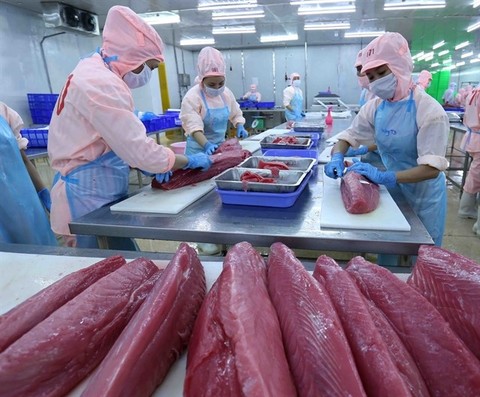
Processing tuna for export at Bá Hải JSC's factory. Seafood enterprises and fishermen currently face difficulties from the regulation on the minimum size for tuna they are allowed to catch. —VNA/VNS Photo
Deputy Prime Minister Lê Minh Khái has assigned the Ministry of Finance and the Ministry of Agriculture and Rural Development (MARD) to coordinate with relevant ministries and agencies to remove difficulties of seafood enterprises.
According to recommendations from the Việt Nam Association of Seafood Exporters and Producers (VASEP), the fishing industry faces many difficulties including unreasonable regulation on ceiling interest costs during calculating income tax, unreasonable delays in getting fishing certifications and problems with the minimum size set for the tuna they are allowed to land.
Fishing enterprises have reflected that imposing a ceiling on interest costs during calculation of corporate income tax is unreasonable.
Specifically, according to Decree 132/2020, in case the total value of loans a bank granted to a business exceeds 25 per cent of the latter’s equity, and accounts for over 50 per cent of the latter’s total medium and long term loans, the bank and the business will be regarded as affiliated parties.
In this case, when determining taxable income, the interest expenses in lending transactions with affiliated parties of the business, including the bank mentioned above, must not exceed 30 per cent of the total net profit. Any excessive amount would be considered unreasonable expenses and therefore liable to corporate income tax.
Most Vietnamese businesses are small and medium-sized enterprises and start-ups, so bank loans are the main source of investment capital for development.
VASEP said this regulation affects enterprises' business results as well as their capital flow in the new investment period.
The lending transactions between banks and enterprises need to be recognised as normal business activities. Imposing a ceiling on interest costs will make the enterprises that have not enough financial ability, hesitate investment and innovation in technology. While, the investment and the innovation are vital requirements for the development of enterprises as well as the country's economy.
The seafood enterprises also complained that issuing a Statement of Catch (SC) at fishing ports after the enterprises bring raw materials to factories are taking too long.
SC is a certificate to the fish processing plants or processors who want to use the fish brought from the port or other means as raw material for processing to fishery products.
The SC certificate ensures the fish/raw material used in the processing process is monitored and regulated until the final processing of fish products.
Many batches of fish material have had to wait up to three months to get the SC certificates. This greatly affects the production and export of enterprises.
VASEP recommends that MARD should change the process on issuing the SC certificate at fishing ports during traceability confirmation under the illegal, unreported and unregulated (IUU) fishing regulations. This is the key to solving many bottlenecks in the IUU control process at present.
The other issue is the regulation on the minimum size of aquatic products permitted in fishing in natural waters in the Government's Decree 37/2024 effective from May 19. The minimum length allowed to catch for skipjack tuna is set at 500 mm (50 cm). Skipjack tuna with a length of 500 mm has a weight of 5–7 kg, while the international standard on size allowed to catch for this kind is 1.8–3.4 kg per unit.
Skipjack tuna for canned food production usually weighs an average of 1.8–3.4 kg per unit because customers prefer canned products made from small-sized fish.
VASEP said Decree 37/2024 will mean a host of difficulties for fishermen who will need to change to new fishing gear with an appropriate mesh size and control the size of tuna that they catch. Traders and export processing enterprises will either not get or face serious shortages of tuna raw materials for purchase and export. — VNS